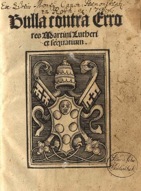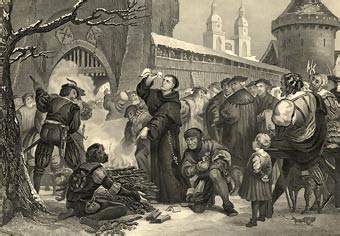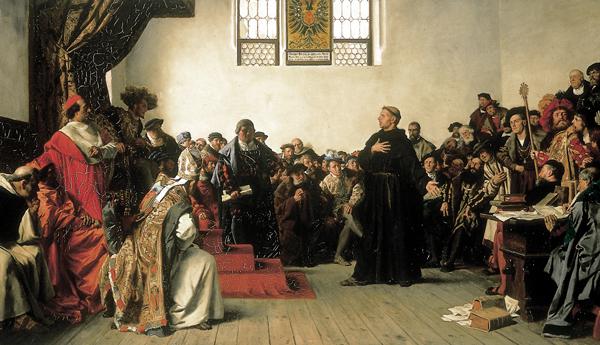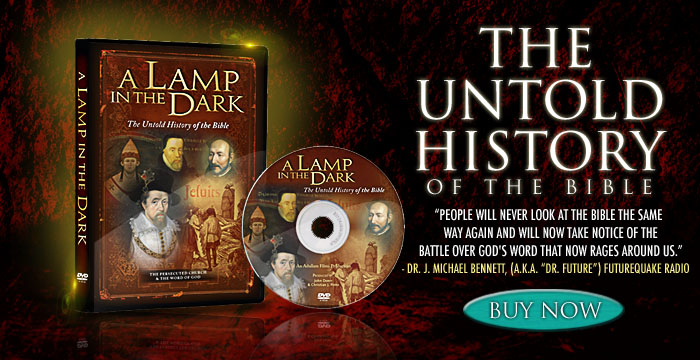MARTIN LUTHER & THE REFORMATION
 Saturday, April 30, 2011 at 1:36AM
Saturday, April 30, 2011 at 1:36AM  NOTRadio
NOTRadio Taken from The History of Protestantism by J.A. Wylie
Edited by Dr. Clive Gillis (eips.org)
The Pope’s Bull of Excommunication Against Luther
 As the bull disseminated Luther penned The Babylonish Captivity of the Church. "I denied that the Papacy was of Divine origin, but I granted that it was of human right. Now ... I know that the Papacy is none other than the kingdom of Babylon ... I therefore beseech all my friends and all the booksellers to burn the books that I have written on this subject, and to substitute this; one proposition in their place: The Papacy is a general chase led by the Roman bishop to catch and destroy souls."
As the bull disseminated Luther penned The Babylonish Captivity of the Church. "I denied that the Papacy was of Divine origin, but I granted that it was of human right. Now ... I know that the Papacy is none other than the kingdom of Babylon ... I therefore beseech all my friends and all the booksellers to burn the books that I have written on this subject, and to substitute this; one proposition in their place: The Papacy is a general chase led by the Roman bishop to catch and destroy souls."
Luther also reviewed the Sacramental theory of the Church of Rome. The priest and the Sacrament - these are the twin pillars of the Papal edifice. "Without faith in God's promise," said Luther, "the Sacrament is dead; it is a casket without a jewel, a scabbard without a sword."
Luther's address to the Pope
Then he respectfully addressed Leo X:
"To the most Holy Father in God, Leo X., Pope at Rome, be all health in Christ Jesus, our Lord. Amen.
It is true I have attacked some anti-Christian doctrines, and have inflicted a deep wound on my adversaries because of their impiety. Of this I repent not, as I have here Christ for an example ... Cursed be he who doeth the work of the Lord negligently. Most excellent Leo ... my wish is that you may enjoy the most precious blessings throughout eternity. One thing only I have done; I have maintained the word of truth ... It is true that I have attacked the court of Rome; but neither yourself nor any man living can deny that there is greater corruption in it than was in Sodom and Gomorrah, and that the impiety that prevails makes cure hopeless. Yes, I have been horrified in seeing how, under your name, the poor followers of Christ were deceived ... You know it. Rome has for many years been inundating the world with whatever could destroy both soul and body. The Church of Rome, formerly the first in holiness, has become a den of robbers, a place of prostitution, a kingdom of death and hell; so that Antichrist himself, were he to appear, would be unable to increase the amount of wickedness. All this is as clear as day ... It is all over with the court of Rome. The wrath of God has overtaken and will consume it. It hates counsel-it fears reform-it will not moderate the fury of its ungodliness; and hence it may be justly said of it as of its mother: We would have healed Babylon, but she is not healed-forsake her ... Is it not true that under the vast expanse of heaven there is nothing more corrupt, more hateful than the Roman court? In vice and corruption it infinitely exceeds the Turks. Once the gate of heaven, it has become the mouth of hell-a wide mouth which the wrath of God keeps open, so that on seeing so many unhappy beings thrown headlong into it, I was obliged to lift my voice as in a tempest, in order that, at least, some might be saved from the terrible abyss."
To this he attaches the "Liberty of the Christian" for Leo's edification. The two poles of that liberty he describes as faith and love, faith which makes the Christian free, and love which makes him the servant of all. Having presented this little treatise to one who "needed only spiritual gifts," he adds, "I commend myself to your Holiness. May the Lord keep you for ever and ever! Amen."
So spoke Luther to Leo-the monk of Wittenberg to the Pontiff of Christendom. Luther also addressed De Vio, Eck, and Miltitz, those agents who had come from the Roman court. "I cannot retract my doctrine. I cannot permit rules of interpretation to be imposed upon the Holy Scriptures. The Word of God-the source whence all freedom springs-must be left free ... Charity urges me, and I cannot resist sending forth a warning cry."
The bull of excommunication arrived at Wittenberg in October, 1520. It had been published widely but in Wittenberg the university possessed in this matter power greater than the Bishop of Brandenburg to prevent it. The arrival of the terrible missive caused no fear in the heart of Luther. On the contrary, it inspired him with fresh courage. The movement was expanding into greater breadth. He saw clearly the hand of God guiding it to its goal. Meanwhile the Reformer took those formal measures that were necessary to indicate his position in the eyes of the world, in the eyes of the Church which had condemned him, and in the eyes of posterity. He renewed his appeal with all solemnity from Leo X. to a future Council .And since this was not Luther's affair only, but that of all Christendom, and accordingly he accompanied his protest against the bull by a solemn appeal to the "emperor, the electors, princes, barons, nobles, senators, and the entire Christian magistracy of Germany," calling upon them, for the sake of Catholic truth, the Church of Christ, and the liberty and right of a lawful Council, to stand by him and his appeal.
Luther burns the Bull
 A placard on the walls of the University of Wittenberg announced that it was Luther's intention to burn the Pope's bull, and that this would take place at nine o'clock in the morning of December 10th, at the eastern gate of the town. On the day and hour appointed, Luther was seen to issue from the gate of the university, followed by a train of doctors and students to the number of 600, and a crowd of citizens who enthusiastically sympathised. The procession held on its way through the streets of Wittenberg, till, making its exit at the gate, it bore out of the city-for all unclean things were burned without the camp-the bull of the Pontiff. Arriving at the spot where this new and strange immolation was to take place, the members of the procession found a scaffold already erected, and a pile of logs laid in order upon it. One of the more distinguished Masters of Arts took the torch and applied it to the pile. Soon the flames blazed up. At this moment, the Reformer, wearing the frock of his order, stepped out from the crowd and approached the fire, holding in his hand the several volumes which constitute the Canon Law, the Compend of Gratian, the Clementines, the Extravagants of Julius II., and other and later coinages of the Papal mint. He placed these awful volumes one after the other on the blazing pile. This hecatomb of Papal edicts was not yet complete. The bull of Leo X. still remained. Luther held it up in his hand. "Since thou hast vexed the Holy One of the Lord," said he, "may everlasting fire vex and consume thee." With these words he flung it into the burning mass. Eck had pictured to himself the terrible bull, as he bore it in triumph across the Alps, exploding in ruin above the head of the monk. A more peaceful exit awaited it. For a few moments it blazed and crackled in the flames, and then it calmly mingled its dust with the ashes of its predecessors, that winter morning, on the smouldering pile outside the walls of Wittenberg. The blow had been struck. The procession reformed. Doctors, masters, students, and townsmen, again gathering round the Reformer, walked back, amid demonstrations of triumph, to the city.
A placard on the walls of the University of Wittenberg announced that it was Luther's intention to burn the Pope's bull, and that this would take place at nine o'clock in the morning of December 10th, at the eastern gate of the town. On the day and hour appointed, Luther was seen to issue from the gate of the university, followed by a train of doctors and students to the number of 600, and a crowd of citizens who enthusiastically sympathised. The procession held on its way through the streets of Wittenberg, till, making its exit at the gate, it bore out of the city-for all unclean things were burned without the camp-the bull of the Pontiff. Arriving at the spot where this new and strange immolation was to take place, the members of the procession found a scaffold already erected, and a pile of logs laid in order upon it. One of the more distinguished Masters of Arts took the torch and applied it to the pile. Soon the flames blazed up. At this moment, the Reformer, wearing the frock of his order, stepped out from the crowd and approached the fire, holding in his hand the several volumes which constitute the Canon Law, the Compend of Gratian, the Clementines, the Extravagants of Julius II., and other and later coinages of the Papal mint. He placed these awful volumes one after the other on the blazing pile. This hecatomb of Papal edicts was not yet complete. The bull of Leo X. still remained. Luther held it up in his hand. "Since thou hast vexed the Holy One of the Lord," said he, "may everlasting fire vex and consume thee." With these words he flung it into the burning mass. Eck had pictured to himself the terrible bull, as he bore it in triumph across the Alps, exploding in ruin above the head of the monk. A more peaceful exit awaited it. For a few moments it blazed and crackled in the flames, and then it calmly mingled its dust with the ashes of its predecessors, that winter morning, on the smouldering pile outside the walls of Wittenberg. The blow had been struck. The procession reformed. Doctors, masters, students, and townsmen, again gathering round the Reformer, walked back, amid demonstrations of triumph, to the city.
Luther's warning
 The next day, as he was lecturing on the Psalms, Luther reverted to the episode of the bull. The burning of the Papal statutes, said he, addressing the crowd of students that thronged the lecture-room, is but the sign, the thing signified was what they were to aim at, even the conflagration of the Papacy.
The next day, as he was lecturing on the Psalms, Luther reverted to the episode of the bull. The burning of the Papal statutes, said he, addressing the crowd of students that thronged the lecture-room, is but the sign, the thing signified was what they were to aim at, even the conflagration of the Papacy.
"Unless with all your hearts you abandon the Papacy, you cannot save your souls. The reign of the Pope is so opposed to the law of Christ and the life of the Christian, that it will be safer to roam the desert and never see the face of man, than abide under the rule of Antichrist. I warn every man to look to his soul's welfare, lest by submitting to the Pope he deny Christ. The time is come when Christians must choose between death here and death hereafter. For my own part, I choose death here. I cannot lay such a burden upon my soul as to hold my peace in this matter: I must look to the great reckoning. I abominate the Babylonian pest. As long as I live I will proclaim the truth. If the wholesale destruction of souls throughout Christendom cannot be prevented, at least I shall labour to the utmost of my power to rescue my own countrymen from the bottomless pit of perdition."
Rome would make Wittenberg and its movement a reproach, a desolation. She did speak, she did stretch out her arm, she did launch her bolt. And what was the result? To Rome a terrible and appalling one. The monk, rising up in his strength, grasped the bolt hurled against him from the Seven Hills, and flung it back at her from whom it came.


Reader Comments